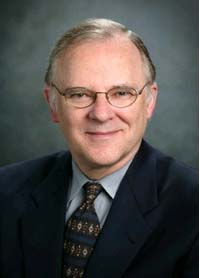
New Dean Ethiopia RPCV Dr. Paul C. Brown Bullish on Business School
New Dean Bullish on Business School
(April 5, 2004) -- Paul Browne is uniquely situated to serve as the new Dean of the Jay S. Sidhu School of Business and Leadership at Wilkes University.
The following appeared in a recent edition of the Scranton Times and the Sunday Voice.
By: DAVID FALCHEK
The Sidhu school, created from an existing program with a $3 million gift from alumnus Jay Sidhu and Sovereign Bank, will expand its curriculum to focus on leadership, ethics, and entrepreneurship. Dr. Browne's background reflects a history of social responsibility and high-level executive training.
As a child, Dr. Browne lived in China and Brazil, where his parents were missionaries. He spent two years with the Peace Corps, teaching math in Ethiopia. Later, he led a team of advisors to the Ecuadorian government as part of the Institute of Public Administration.
He studied at Princeton, Harvard, and taught at the Wharton School of Business for 15 years. A polyglot, Dr. Browne traveled the world teaching global executives leadership and management skills, often in native languages.
Dr. Browne became the first dean of the Sidhu School in February. BusinessWeekly spoke with him about his life, the first few months on the job and the direction of the program.
Q: Does the education at nameplate institutions such as Princeton, Harvard and Wharton live up to the hype?
A: The answer has to be yes. There is opportunity for a high exposure to ideas. More than anything, students find themselves in a peer group with the expectation for performance.
Yet, the success of going to those schools depends greatly on the individual student. A lot of people go to those schools and don't take full advantage of what they offer. Other schools may not have the reputation of those schools, but the opportunity for learning is present there as well.
Q: Why leave a comfortable job as a consultant to come to preside over a business school at a small private university?
A: I was working for Strategic Management Group in Philadelphia for many years. I went on board with them full-time in 1996 after leaving the Wharton faculty. The group does consulting and training in middle and upper level management using technology as a tool to create simulations and experiential learning. I had a great time there and continue to do some work with them. I was recruited by Wilkes and I was open to the returning to higher education.
Q: What made you accept Wilkes' offer?
A: I believe in small schools. I got my undergraduate degree at the College of Wooster in Ohio. What I learned in my years as a student, professor and administrator is that you can do things on a small scale that can't be done on a large scale. Change and improvement in a place the size of Wilkes University can be faster than at a large school.
Q: How will the Sidhu School and it curriculum be different?
A: The development of managers isn't just a technical process where you teach human resources, management, and accounting. There is a qualitative dimension having to do with leadership capability.
Business schools have under-emphasized leadership growth and development. In addition to teaching the blocking and tackling of business, the curriculum will be predicated on leadership development. So many people go into the work force thinking of themselves as workers and not as leaders. People end up getting forced into leadership roles and aren't ready for it. We will equip our students to grow as leaders. That begins with self awareness, contributing to the success of others, and managing one's self, which is where leadership begins.
Q: Is this curriculum the product of some of the high-profile business scandals over the last few years?
A: No. That's coincidental and we would be doing this regardless of that. What has happened is that our move had become more timely and salient considering the crisis in confidence in educational institutions producing business leaders. The fact remains, that our approach is a good idea on its own.
Q: What would you like to accomplish as dean beyond revamping the undergraduate curriculum?
A: There are two other dimensions of the Sidhu school that will emerge. We have an MBA program that serves mostly part-time students rounding out their education. That's been growing and we'll introduce more of the leadership focus, but with a different pitch since we'll be catching people in mid-stream, working with people who are already at work.
We want to start a dialogue with businesses in the area to ask how can we add value through management development and executive training for people who aren't going to go back to school.
Q: What has been your impression of Wilkes-Barre?
A: Right now we have an apartment in the city and we plan to live in Wilkes-Barre. We are city people. Once (wife) Carol leaves her job, we'll start house hunting in earnest, looking for something in the area of downtown. We are impressed with the civic commitment to rebuilding the downtown and we want to be part of that.
